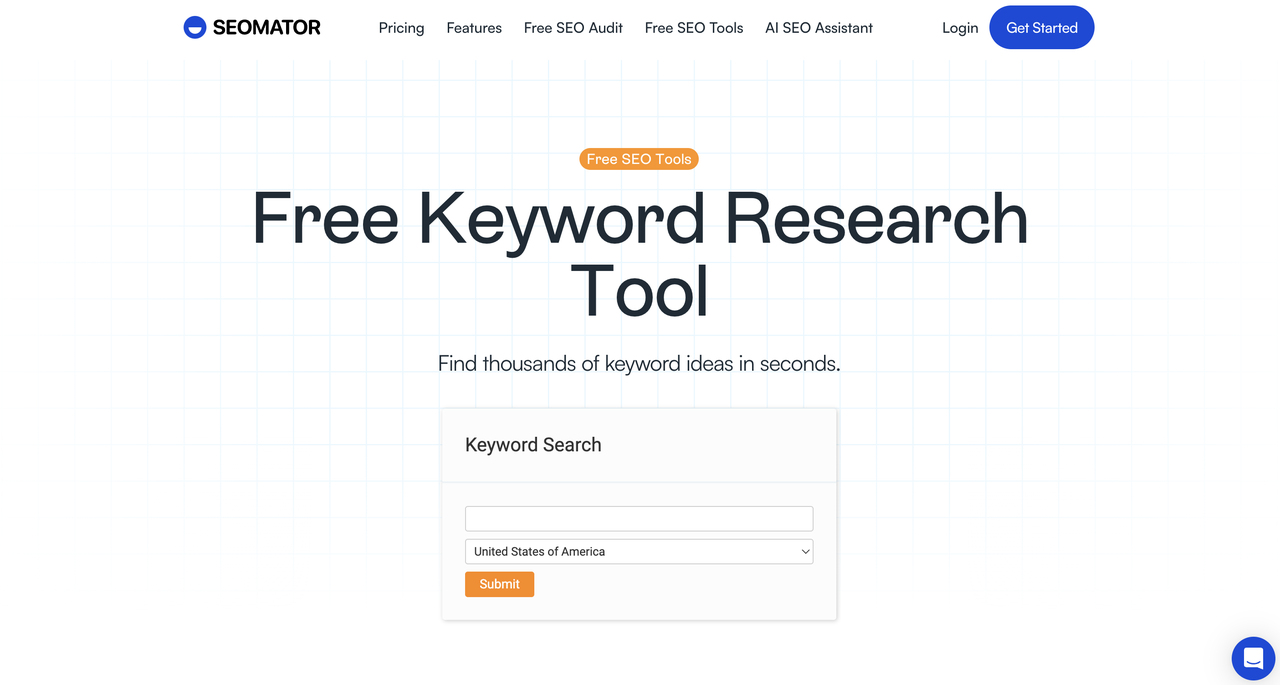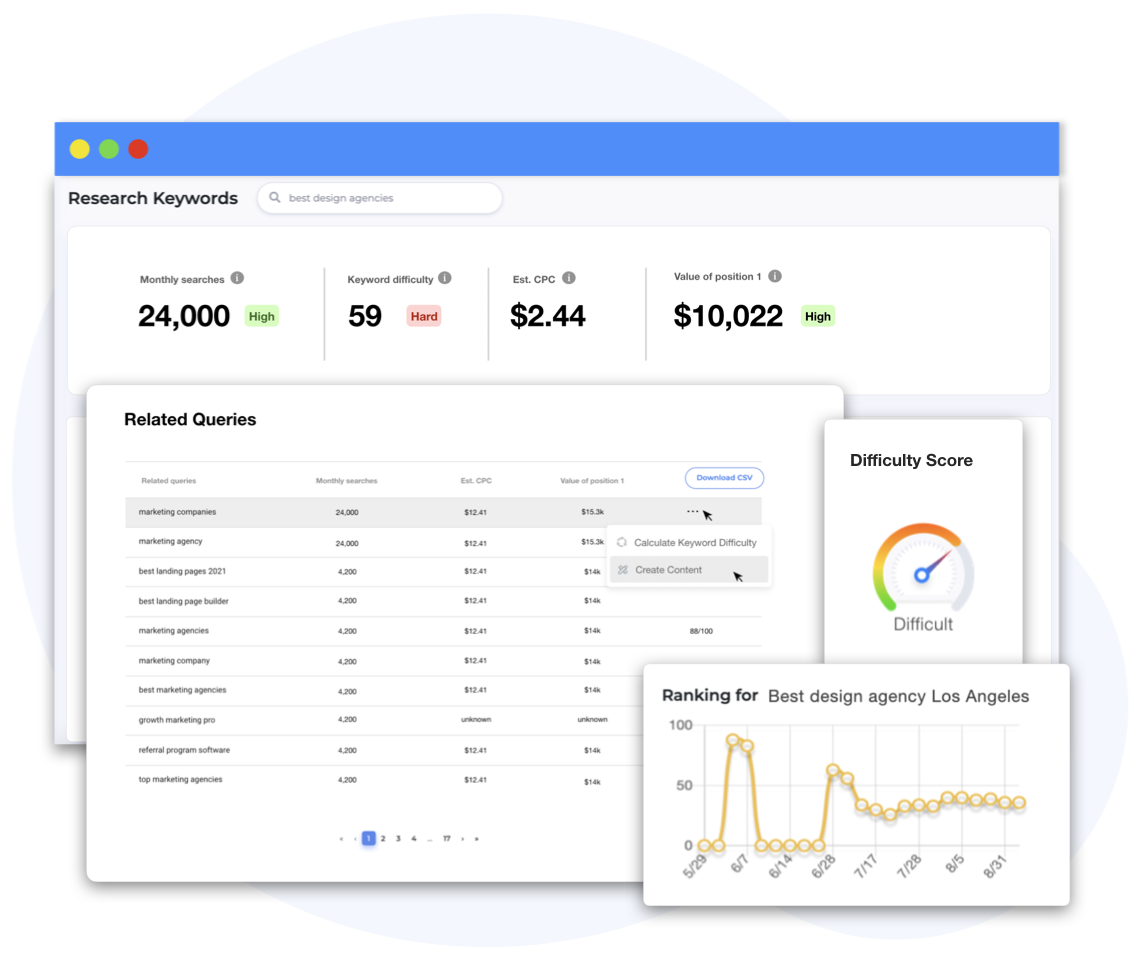Search results pages are crowded these days, with everyone vying for a spot at the top. This means that if you want good placement for a simple, generic search term, you're going to face a lot of competition.

That's why, when conducting keyword research, it's important to target lengthy, highly-specific keywords — these are known as long-tail keywords.
Long-tail keywords are usually well-thought-out queries in the form of questions, phrases, and sentences. They’re typically three or more words long. The term “long-tail” refers to the “long tail” of a search’s demand curve. As queries around a topic become more specific, the search volume decreases while the likelihood of conversion increases. This creates a skewed distribution, as illustrated below:

Long-tail keywords are especially valuable in retail because their high specificity indicates high purchase intent. Also, it's much easier to rank for long-tail keywords versus their more general counterparts, as long-tail keywords comprise 92% of all keywords typed into search engines.
Many marketers use Google Keyword Planner to get ideas, but this tool is limited in that it refers more directly to paid search data. There are plenty of other long-tail keyword tools that you can use for uncovering opportunities to rank in organic search.
In this post, we’ll recommend 15 of our favorite tools that you can use to uncover long-tail keyword opportunities for your content. But first, let’s review some strategies for finding these keywords — these are where SEO tools can be a major help.
How to Identify Long-Tail Keywords
There is a virtually infinite number of long-tail keyword you can try to target with your content. Of course, not all long-tail keywords are made equal — here are some proven strategies for finding the ones most relevant to your visitors and readers.
1. Examine autocomplete suggestions in Google directly.
A good starting point for collecting a pool of long-tail keywords is to simply enter a broad keyword into Google (or any search engine) and see what autocomplete suggestions appear.

You can also consult the “People also ask” section if Google provides one, then enter those queries into Google and see how they autocomplete.

Or, look at the related searches listed at the bottom of the page.

With this approach, you’ll see exactly what is popular on Google without any guesswork. However, it’s not the most practical method for researching long-tail variations, which is where keyword research tools can come in handy.
2. Use question modifiers like “what” and “how.”
More and more, Google users are entering their queries as questions. When brainstorming long-tail queries your target audience might ask, be sure to generate some that begin with modifiers like “what,” “how,” “where,” etc.
These words uncover specific issues that people have, and will probably appear often while reviewing long-tail keywords in your SEO tools of choice.
3. Add qualifiers to short-tail keywords.
Similarly, try adding qualifying terms to your keywords relevant to your business, product, and/or content. For example, if you sell umbrellas, append a combination of terms like “blue,” “large,” “heavy-duty,” or anything else you believe is relevant.
Try adding localization information as well, for instance, “large heavy-duty umbrellas Boston.” Specific, yes, but chances are potential visitors are sending queries like these to narrow their search to their geographic region, meaning a higher chance of conversion.
4. Look at your internal site search history.
If your website has an internal search function, check for what users are looking for. You might be surprised at some queries — they may target particular products or pose highly specific questions.
If visitors are posing these questions on your site, they might also be plugging them into search engines. So, use this valuable info to create new pages entirely dedicated to these specific long-tail keywords.
5. Research your competitors.
With help from Google search and SEO tools, you can peek at your competitors for which specific long-tail keywords they’re using to make the first SERP for more general queries and help boost your own keyword research in SEO. Take note of the keywords that appear frequently on top-ranking pages and see how you can incorporate them into your content while improving on editorial and visitor experience. Plus, you’ll gain exposure to keywords and ideas you might not have considered previously.
6. Run a gap analysis.
A gap analysis is the process of reviewing your site’s content for topics that you’re not currently covering or ranking highly for — this gives insight into which topic areas (and long-tail keywords) to target on your pages.
A gap analysis can be conducted by reviewing your existing articles for areas that could be touched on or improved. Additionally, many SEO tools allow you to audit your keyword rankings and see what keywords you’re ranking well or poorly for in comparison with your competitors.
Now that we’ve seen how marketers can utilize SEO tools to uncover long-tail keywords, let’s review the best options available today for this purpose.
Best Tools for Finding Long-Tail Keywords
- HubSpot Content Strategy Tool
- Answer the Public
- Semrush
- SEOmator
- KWFinder
- GrowthBar
- SE Ranking
- Rank Tracker
- Keyword Tool Dominator
- Wordtracker
- Ubersuggest
- LongTailPro
- SECockpit
- Keywords Everywhere
- Google Trends
1. HubSpot Content Strategy Tool
HubSpot's SEO Marketing Software is an all-in-one SEO tool that can help plan your SEO strategy, optimize your website content, and measure your return on investment.
The content strategy tool makes it easy to discover keywords with suggestions based on relevance, competition, and popularity. What sets HubSpot's tool apart is a focus on content topic clusters, which search engines prefer. This tool also actively monitors your optimized content to ensure it's still relevant over time (helping you understand when changes need to be made).
2. AnswerThePublic
AnswerThePublic is a top tool for long-tail keyword suggestions because it generates common questions asked about your seed keyword (the keyword you input initially) on social media, blogs, and forums.
It also offers comparison keywords, which can provide excellent opportunities to rank in relevant searches. Check the "versus" section of AnswerThePublic for your keyword and you'll be surprised by how many people do searches about X vs Y (e.g., Instagram vs Snapchat).
As comprehensive as the keyword suggestions are, one downside to AnswerThePublic is that it does not provide search volume data. Without this information, which you truly need to make informed decisions, the Pro version isn't quite worth the money compared to some other long-tail keyword tools on this list. However, it's still a useful resource for marketers.

3. Semrush
Semrush is an all-in-one marketing toolkit, primarily known and used for its keyword research feature.
Semrush makes it easy to search for keywords and find their rankings in all the major search engines. Other useful features include keyword searching based on geographic location, as well as competitive intelligence around what keywords your competitors are targeting. These benefits are limited to paid subscription plans, but a Semrush free trial is available if you want to test it out before investing.

4. SEOmator
SEOmator offers a compelling resource for your keyword research needs. SEOmator's Free Keyword Research Tool is a gateway to long-tail keyword success without the cost commitment.
Powered by its advanced algorithms and a vast database, it delves deep into keyword variations, helping you discover untapped potential. Beyond search volume, it offers crucial information like keyword difficulty, competition analysis, and CPC.
This empowers you to make informed decisions about which keywords to target, ensuring that your content resonates with your audience while staying aligned with your SEO goals. Besides, it offers an exporting option for all the results you searched for and to keep keywords to review and even use later.
SEOmator's free tool eliminates barriers, allowing you to harness the power of valuable keywords without any upfront investment.

5. KWFinder
KWFinder is perfect for beginners but still valuable to more advanced bloggers. It offers a clean interface and a quick search feature that can generate hundreds of low-competition keywords relevant to your site. It also pairs each keyword with an SEO difficulty score, helping you to understand if it's realistic for your site to rank for a given term.
Since KWFinder is a paid tool, subscribers also benefit from advanced features such as SERP (search engine results page) analysis, rank tracking, and filtering results. You can test-drive these features when you sign up for a free trial.
Keep in mind that KWFinder is Google-SERP oriented, so use a different long-tail keyword tool if you need keywords optimized for other search engines.

6. GrowthBar
GrowthBar is a great tool for creating SEO-friendly content. GrowthBar features AI writing to help create long-form blog posts quickly. With a keyword database of over 2 billion keywords, GrowthBar has one of the largest keyword databases in the world.
Keyword data includes related keywords, search volume, competitiveness, Google Ads CPC, and a proprietary metric called "value of position one," which helps SEOs determine how profitable ranking for a keyword is. GrowthBar also features keyword rank tracking, competitor analysis, and AI writing tools that help marketers create meta descriptions, blog ideas, and full long-form content with the click of a button. Plus, GrowthBar has built-in audit features, so you can know whether the keywords and articles you're writing are optimized for SEO.
The keyword database is accessible with paid plans starting at $29/month.
 7. SE Ranking
7. SE Ranking
Keyword Suggestion Tool by SE Ranking provides all critical SEO metrics for each analyzed keyword, including search volume, keyword difficulty, search intent, keyword relevance, competition, etc. It generates thousands of similar, related, long-tail, and question-based keywords to bolster your keyword list and explores organic and paid search competitors. This keyword database is packed with 4.2 billion keywords from 188 countries.
To find specifically long-tail keyword opportunities, apply the word count filter or go to the Low Search Volume tab of keyword suggestions. With advanced ungrouping techniques and an AI-powered algorithm, the platform delivers the most precise search volume for each keyword separately.
Keyword Suggestion Tool is available with starting price of $55 per month for the platform’s Essential subscription, but you can also check out the tool with a free 14-day trial.
8. Rank Tracker
Rank Tracker is your go-to tool for keyword analysis and tracking that also helps you discover many long-tail keyword ideas. They boast over 20 keyword research features, ranging from Google/YouTube autocomplete to Related Questions and Searches.
If you only have a few keyword ideas in mind or know your competitor's domain URL, Rank Tracker will generate an extensive list of key phrases for you.
To enhance your understanding and utilization of these found long-tail keywords, you can rely on various analysis metrics, including search volume, keyword difficulty, competition, and more. Apply a few filters, and you'll receive a list of words primed to deliver optimal results. To top it off, you can organize this keyword list into relevant groups based on your website's structure and begin monitoring your progress in the rank-tracking module.
Rank Tracker supports 400+ search engines, its proprietary keyword index, unlimited projects, and a variety of handy dashboards for quick SERP and competitor analysis.
9. Keyword Tool Dominator
Keyword Tool Dominator uses the autocomplete feature of different website searches to identify ideal long-tail keywords.
To help visualize how it works, start typing a search query into Google search and take note of the suggestions that appear. These suggestions are indexed by Keyword Tool Dominator, which the company leverages to provide up-to-date long-tail keyword ideas.
Besides offering suggestions for Google search, Keyword Tool Dominator can also provide insights to optimize for search on platforms such as Amazon, eBay, and YouTube.
While Keyword Tool Dominator is very basic, it's also completely free to use.

10. Wordtracker
Sometimes keyword tools give nonsense results that are difficult for writers to use in their SEO content. Instead, Wordtracker focuses on delivering the most relevant keywords from Google, YouTube, and Amazon. Wordtracker is celebrated for its ability to provide organized data files that are easier to read and understand than the messy spreadsheets some other tools provide as an output option.
Wordtracker's "niche explorer" can help you to identify keywords that are trending in your industry, filtered by location and search engine. If the process of conducting keyword research is new to you, make sure to check out Wordtracker Academy — a wealth of information for SEO beginners.
You can access Wordtracker Academy, niche explorer, and up to 12 searches for free. If you want more searches and additional functionality, you can sign up for a free trial that leads to a paid subscription.

11. Ubersuggest
Once an independent keyword tool, Ubersuggest has been acquired by Neil Patel and since became notably more powerful. It now includes a domain overview that provides information regarding what's working for your competitors, backlink checking, and content suggestions with keyword searches.
Ubersuggest's keyword suggestions are based on Google SERPs and Google Ads data. The SERP analysis feature gives an overview of the top 100 sites that rank for a term, and the keyword overview shows search volume data over the last 12 months.
It's free to use Ubersuggest with limited results, but you can take advantage of a free trial to see if the advanced features included with the subscription price are worth it.

12. LongTailPro
LongTailPro is an all-in-one SEO tool that has come a long way from the keyword-research desktop application it once was. It's especially useful for finding long-tail, high cost-per-click (CPC) keywords for your paid ad campaigns. It's ideal for taking one seed keyword, then finding every related series of long-tail keywords.
Some additional features of LongTailPro include, competitor keyword research, daily keyword tracking, a keyword-rich domain name finder, and a rank value that determines keyword profitability
This suite of unique features isn't free, but, like many other long-tail keyword tools on this list, LongTailPro offers a free trial to test out functionality.

13. SECockpit
SECockpit is often compared to LongTailPro because they offer similar features. To be more specific, both use Moz and Google Keyword Planner as main data sources and offer a keyword competitiveness rating and filtering option.
What sets SECockpit apart is that it's more geared toward SEO professionals (versus users optimizing for paid ad campaigns). With its keyword suggestions, you can choose to include synonyms from Google Ads, Google Suggest, Amazon Suggest, YouTube Suggest, and Google Related Searches. It displays these results alongside competitor data for comparison, and you can add additional parameters to get more relevant suggestions.
SECockpit offers agency-level subscription plans.

14. Keywords Everywhere
Keywords Everywhere is a browser extension available for Chrome and Firefox, making it one of the most convenient long-tail keyword tools on this list.
Keywords Everywhere adds widgets to Google SERPs that display related keywords and "People also search for" keywords. It includes data for monthly search volume, CPC, and competition.

15. Google Trends
If you need to find the most popular keywords right now (or in the past), look no further than Google Trends.
With Google Trends, you can find out if interest in a particular keyword is growing or declining and stack two keywords up against each other to see how their popularity compares. You can also filter interest according to regions and subregions, which is useful when you're targeting a specific geographic area.
This is an incredibly simple (and, as a result, limited) tool from Google that is completely free to use.

The Best Long-Tail Keyword Tools
As ranking for search engine results become extremely competitive, long-tail keywords are your saving grace. In general, they are more specific than short-tail keywords, carry more purchase intent, and are often easier to rank for. So, amp up your content strategy with the help of these long-tail keyword tools.
Editor's note: This post was originally published in October 2019 and has been updated for comprehensiveness.







![Why You Should Want Visitors to Click Through Multiple Screens [Data + Tips]](https://blog.hubspot.com/hubfs/GettyImages-1256724253.jpg)
![10 Best Tools to Check Website Traffic [+ What They’re Best For]](https://blog.hubspot.com/hubfs/GettyImages-1332148900 copy.jpg)

